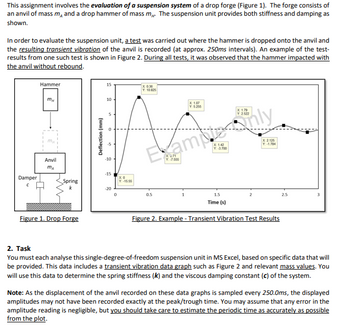
Elements Of Electromagnetics
7th Edition
ISBN: 9780190698614
Author: Sadiku, Matthew N. O.
Publisher: Oxford University Press
expand_more
expand_more
format_list_bulleted
Concept explainers
Question
thumb_up100%
please wright by hand and step by step thank you

Transcribed Image Text:This assignment involves the evaluation of a suspension system of a drop forge (Figure 1). The forge consists of
an anvil of mass m, and a drop hammer of mass m. The suspension unit provides both stiffness and damping as
shown.
In order to evaluate the suspension unit, a test was carried out where the hammer is dropped onto the anvil and
the resulting transient vibration of the anvil is recorded (at approx. 250ms intervals). An example of the test-
results from one such test is shown in Figure 2. During all tests, it was observed that the hammer impacted with
the anvil without rebound.
Damper
Hammer
MH
Anvil
MA
Spring
Figure 1. Drop Forge
Deflection (mm)
15
10.
-10
-15
-20
0
хо
Y-15.56
X: 0.36
Y 10 825
0.5
X: 1.07
Y: 5255
142
Kampenly
Y: -3.700
Y: -7.555
X 1.79
Y: 2522
1.5
Time (s)
x 2.125
Y: -1.794
Figure 2. Example - Transient Vibration Test Results
2.5
3
2. Task
You must each analyse this single-degree-of-freedom suspension unit in MS Excel, based on specific data that will
be provided. This data includes a transient vibration data graph such as Figure 2 and relevant mass values. You
will use this data to determine the spring stiffness (k) and the viscous damping constant (c) of the system.
Note: As the displacement of the anvil recorded on these data graphs is sampled every 250.0ms, the displayed
amplitudes may not have been recorded exactly at the peak/trough time. You may assume that any error in the
amplitude reading is negligible, but you should take care to estimate the periodic time as accurately as possible
from the plot.
Expert Solution
This question has been solved!
Explore an expertly crafted, step-by-step solution for a thorough understanding of key concepts.
This is a popular solution
Trending nowThis is a popular solution!
Step by stepSolved in 6 steps with 2 images

Knowledge Booster
Learn more about
Need a deep-dive on the concept behind this application? Look no further. Learn more about this topic, mechanical-engineering and related others by exploring similar questions and additional content below.Similar questions
- What is compression testing?arrow_forwardWhich among the following guideline(s) is/are recommended by Design for Manufacturing and Assembly? O a. Minimize production cost. O b. Avoid using separate fasteners Oc. All of these O d. Maximize compatibilityarrow_forwardDescribe Multistage Compression with Intercooling?arrow_forward
arrow_back_ios
arrow_forward_ios
Recommended textbooks for you
 Elements Of ElectromagneticsMechanical EngineeringISBN:9780190698614Author:Sadiku, Matthew N. O.Publisher:Oxford University Press
Elements Of ElectromagneticsMechanical EngineeringISBN:9780190698614Author:Sadiku, Matthew N. O.Publisher:Oxford University Press Mechanics of Materials (10th Edition)Mechanical EngineeringISBN:9780134319650Author:Russell C. HibbelerPublisher:PEARSON
Mechanics of Materials (10th Edition)Mechanical EngineeringISBN:9780134319650Author:Russell C. HibbelerPublisher:PEARSON Thermodynamics: An Engineering ApproachMechanical EngineeringISBN:9781259822674Author:Yunus A. Cengel Dr., Michael A. BolesPublisher:McGraw-Hill Education
Thermodynamics: An Engineering ApproachMechanical EngineeringISBN:9781259822674Author:Yunus A. Cengel Dr., Michael A. BolesPublisher:McGraw-Hill Education Control Systems EngineeringMechanical EngineeringISBN:9781118170519Author:Norman S. NisePublisher:WILEY
Control Systems EngineeringMechanical EngineeringISBN:9781118170519Author:Norman S. NisePublisher:WILEY Mechanics of Materials (MindTap Course List)Mechanical EngineeringISBN:9781337093347Author:Barry J. Goodno, James M. GerePublisher:Cengage Learning
Mechanics of Materials (MindTap Course List)Mechanical EngineeringISBN:9781337093347Author:Barry J. Goodno, James M. GerePublisher:Cengage Learning Engineering Mechanics: StaticsMechanical EngineeringISBN:9781118807330Author:James L. Meriam, L. G. Kraige, J. N. BoltonPublisher:WILEY
Engineering Mechanics: StaticsMechanical EngineeringISBN:9781118807330Author:James L. Meriam, L. G. Kraige, J. N. BoltonPublisher:WILEY

Elements Of Electromagnetics
Mechanical Engineering
ISBN:9780190698614
Author:Sadiku, Matthew N. O.
Publisher:Oxford University Press

Mechanics of Materials (10th Edition)
Mechanical Engineering
ISBN:9780134319650
Author:Russell C. Hibbeler
Publisher:PEARSON

Thermodynamics: An Engineering Approach
Mechanical Engineering
ISBN:9781259822674
Author:Yunus A. Cengel Dr., Michael A. Boles
Publisher:McGraw-Hill Education

Control Systems Engineering
Mechanical Engineering
ISBN:9781118170519
Author:Norman S. Nise
Publisher:WILEY

Mechanics of Materials (MindTap Course List)
Mechanical Engineering
ISBN:9781337093347
Author:Barry J. Goodno, James M. Gere
Publisher:Cengage Learning

Engineering Mechanics: Statics
Mechanical Engineering
ISBN:9781118807330
Author:James L. Meriam, L. G. Kraige, J. N. Bolton
Publisher:WILEY